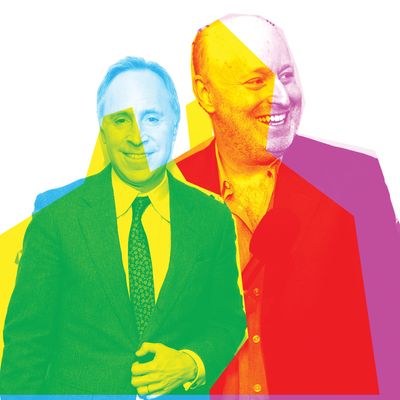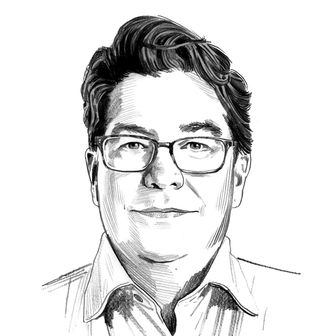
The Americans tells the story of a Russian espionage operation so mind-boggling it seems absurd — or at least it did until, well, you know. The show, which stars Keri Russell and Matthew Rhys as Elizabeth and Philip Jennings, a seemingly normal 1980s suburban couple who are actually super-competent Soviet spies, debuted in 2013. Critics have long praised the crackling verisimilitude of its depiction of a tense marriage, while forgiving its pulpy espionage-plot contrivances. A fantastically successful foreign infiltration of Washington? Who would believe that?
Consider our disbelief suspended. After an election tainted by suspicions of Russian meddling, Cold War paranoia has returned like a long-dormant psychosis, and the period mood of The Americans feels current in a way its creator, Joe Weisberg, never could have foreseen. He says that causes him some dramaturgical dismay. “The whole premise of the show is, Hey, these aren’t the bad guys anymore in our political world, so it’s a good time to sit back and explore their humanity,” Joe said one recent afternoon, sitting on a couch in the Gowanus warehouse building that serves as The Americans’ production office. “So to all of a sudden have it whipping up again, everybody screaming about how they’re the bad guys, just doesn’t fit with the conception of the show. It’s distracting.”
Joe’s older brother, Jacob, sitting next to him on the couch, cut in with a mordant reality check: “I also wish it weren’t happening.”
The Americans is, first and foremost, a family story, so it felt appropriate to bring the Weisberg brothers together to talk about the Cold War and its present-day echoes. Like the Jennings children on the show, the Weisbergs were teenagers during Ronald Reagan’s presidency, though it affected each of them differently. Jacob became a liberal opinion journalist. (He is now editor-in-chief of the Slate Group, for which he hosts an interview show called Trumpcast, which caustically covers the current president.) Joe, who studied Soviet history at Yale, joined the CIA, where he trained to be an undercover operative. “It was like being swept up in the struggle,” Joe recalled. “I had a passion. People were suffering. People were being oppressed. And I not only hated it but I wanted to do something about it, and when Ronald Reagan spoke about it, to me he sounded very simple and clear-eyed.”
The brothers come from an intellectual Chicago family (their mother, Lois, that city’s former cultural-affairs commissioner, was the subject of a Malcolm Gladwell profile illustrating the power of social connections), so Joe’s anti-communist fervor was a form of rebellion. But he has since moderated, while Jacob has reassessed his view of Reagan, publishing an admiring biography of him last year. “I have been thinking a lot about Reagan in relation to Trump, in the way that people didn’t take Reagan seriously,” Jacob said. “In retrospect, I accord Reagan great respect, but at the time I thought he was a joke.” For many liberal Americans in November 1980, Reagan’s election felt like a dangerously destabilizing event, likely to lead to confrontation — or worse — with the adversary he called the “Evil Empire.” The Americans began on this note of alarm, presenting Reagan’s inauguration from a Soviet perspective. “The American people have elected a madman as their president,” a KGB spy says in the pilot episode. This assessment was actually reflective of what historians found in the Soviet archives.
“They were very scared of him,” Joe said. “A lot of people there thought that Reagan was really serious about possibly trying to come up with a way to launch a nuclear strike on the Soviet Union.” Thankfully, this turned out to be faulty intelligence.
“When you look back at the historical record now,” Jacob said, “what you see is exactly the opposite. Reagan was more than ordinarily freaked out by the idea of nuclear war.”
In the end, the world survived the misunderstanding, and that allows The Americans to cast the gloaming of the Cold War in a soft nostalgic light. Philip and Elizabeth may be agents of a totalitarian system, but viewers know that it’s about to fail, and that makes it possible to sympathize with the characters. “The interesting thing about the story is that it’s both an American story and a Soviet story,” Joe said. “And like in many European stories, a tragic ending as opposed to a happy ending is okay. It seems sort of natural.” Yet the characters don’t know that their Wall is about to fall. They are still in 1984.
In the late 1980s, after college but before the Joe joined the CIA, the Weisbergs traveled around Eastern Europe together. “You didn’t know that those states were going down the drain,” Joe said. Communism was thought to be indomitable. Yet in their reminiscence, the signs of imminent collapse were everywhere: the cheap cans of caviar, the cigarette bribes required for services, the grand restaurant without food, the spy peering through the hotel keyhole. “Romania for me was like going back to Stalin’s time,” Joe said.
“The population was terrorized,” Jacob said.
“I remember we went out to the countryside, and people were pushing around carts, and you felt like you were in the 19th century,” Joe said. “And then in Bucharest, there was urban-style Stalinism.”
“We didn’t go to Bucharest,” Jacob said, and they squabble for a minute about their differing recollections.
Joe has said he developed a “cold-warrior mentality,” which led him to the CIA, where he learned to put his expertise to use in cultivating human assets as an undercover operative. That experience in deception is the basis of The Americans. “As interesting as the show is,” Jacob said, “if you’re Joe’s brother it’s even more interesting, because I knew Joe when he was in the CIA.” He turned to address his brother. “To me, I always come back to the experience you had of having to lie to your friends. Joe has this very close group of friends he’s had since early childhood, and I think it was sort of a life-changing experience for you to have to deceive them. And I have to say, you have the most clueless group of friends! Not one of them had a passing thought that Joe was in the CIA. But just the corrosive effect of having to do that, as a way to live.”
Joe was only in the CIA for a few years, during which time the Soviet Union ceased to exist. He left disillusioned, thinking that the value of intelligence wasn’t worth the risks the agency was asking its assets to take. “How much damage does it do to our reputation and our national security to go around the world recruiting spies?” he asked. “It’s given us a pariah status in many countries, and even our friends in many cases become angry and bitter at us, and that’s a very high cost.” It was only much later, Joe said, that he began to question his entire view of the Cold War. He read the memoirs of former KGB officers and discovered that their ideals and gripes were not so different from his own. “Suddenly, the idea of saying it was an Evil Empire became a sort of childlike view of it, which I ceased to have,” Joe said. That revelation, too, informs The Americans.
One of the most appealing characters in the series is Arkady Zotov, the wily but kind KGB chief at the Washington rezidentura. At the end of season four, Zotov was diplomatically expelled from the United States, one of several characters now back in Moscow as the Soviet Union decays. The season finale also introduced Philip’s long-lost Russian son, an embittered veteran of the Soviet-Afghan war. “If you think about our own society and about Vietnam and all the complexity around there, why would their society be any less complex?” Joe said. “It’s easy to look at it and say people hated the war, they suffered, it helped to bring down the system. But that’s just robbing it of all the complexity that was really there.”
“One of things that’s really interesting,” Jacob said, “is this idea that you were telling me about that the KGB was the high-integrity part of the Soviet bureaucracy.”
“The whole KGB felt — and it was not just a feeling, it was true — that they had not been corrupted like the rest of the Soviet bureaucracy,” Joe said. “So if you saw Putin on Charlie Rose, Charlie Rose said to him, ‘Many people say you’re basically a mobster,’ and Putin said, ‘I don’t know what you’re talking about, I came up in the KGB.’ That was, I believe, a completely sincere comment.” Joe said that, in contrast to his brother and many of his friends, he wasn’t terribly shocked by Putin’s alleged interference in America’s election. “I understand, when there are two candidates running for president and one of them clearly would continue the sanctions and one might not, why they might mount an intelligence operation to make the one who would not continue the economic attack on their country win. That seems like a pretty good idea.
“It’s possible,” Joe went on, “that I think about it that way because I worked at the CIA, where mounting intelligence operations was what you did. And I’m not myself so mad at Russia in general that I can’t look at it and say, ‘Ehhh, we would do that too.’ ”
Joe called Trump’s desire for better relations with Putin “his one good idea” but said he feared that Democrats and Republicans were aligning to brand Russia “a terrible, terrible enemy.” He said his experiences taught him to be wary of raw intelligence, and he has followed the news with some incredulity as previously levelheaded liberals have become avid mole-hunters, poring over the salacious and unsubstantiated Trump dossier produced by a former British intelligence operative and tossing around previously exotic terms like kompromat.
“There is a bizarre role reversal,” Jacob said. While Democrats were suddenly placing great faith in the intelligence community, Trump was assailing its integrity. “You have the president engaging in this kind of moral equivalence that you would more often hear on the extreme left,” Jacob said. “That, like, we kill people too.”
“The whole landscape has shifted,” Joe said. “It’s such a strange feeling.”
“I feel like the past decade or so in politics has been a series of discoveries that one thing after another that was a bedrock assumption shared by nearly everybody turned out to be false,” Jacob said. “You have to then ask yourself, ‘Well, what else could we be collectively wrong about?’ To me, the frightening answer to that question is: assumptions we’ve made about the fundamental stability of American democracy.”
Maybe we actual Americans are more like Weisberg’s characters than we realize — unknowingly headed for a dark rendezvous. But I, for one, am eager for a thrilling escape. At the end of our conversation, Joe walked us out of the offices, which are decorated with old spy-gear props and kitschy memorabilia. Near the door, there’s a big bulletin board covered with events from 1984: “Thriller,” aids, the Los Angeles Olympics, Miami Vice. Joe said the show tries to hit the right cultural notes for the generation that grew up in the 1980s without succumbing to what he called “the temptation to put in a little cutesy something.” So, he assured me, we will definitely not be encountering the flamboyant owner of the USFL’s New Jersey Generals.
“There’s no young Donald Trump,” Joe said.
*This article appears in the March 6, 2017, issue of New York Magazine.





